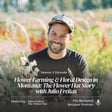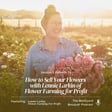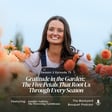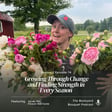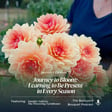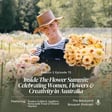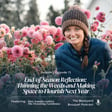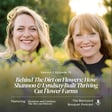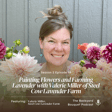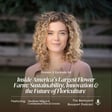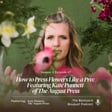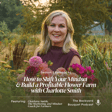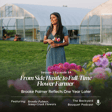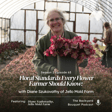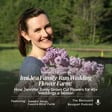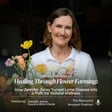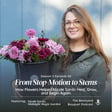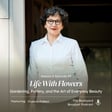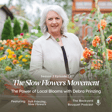
Ep.22 How Breeding Dahlias In Australia Cultivates Curiosity with Bec McConnell of Serenade Farm
Have you ever wondered what happens when a passion for music and farming intertwine to create a symphony of nature and artistry? In Episode 22 of the Backyard Bouquet Podcast, we journey down South to Tamborine Mountain in the Gold Coast of Australia to chat with the remarkable Bec McConnell of Serenade Farm.
Bec shares with us the beautiful story of how her love for gardening and flowers was nurtured from childhood memories of her Nan and Pop's garden, to her backpacking adventures in organic farms across England, Ireland, and Wales. After years of running an entertainment company, Bec and her husband finally realized their dream of owning a farm on Tamborine Mountain, where they initially focused on growing food.
However, it was a serendipitous encounter with a bunch of dahlias that sparked Bec's passion for breeding these vibrant flowers. Over the years, Bec has dedicated herself to hybridizing dahlias, creating unique and stunning varieties like Serenade Curiosity, Serenade Moondance, and Serenade Sonata, each named with a touch of musical inspiration.
Bec's story of passion and creativity will leave you inspired and eager to grow dahlias from seed. Tune in to hear the full interview with Bec McConnell of Serenade Farm and delve deeper into her journey of intertwining music and farming.
***********
Today’s Episode Is Sponsored By Epic Gardening. Shop Epic Gardening’s Memorial Day Sale & Save 30% off All Birdies Beds + up to 55% off select gardening essentials with code THEFLOWERINGFARMHOUSE .
Now through Monday, May 27th, Shop The Memorial Day Sale: https://glnk.io/73j50/thefloweringfarmhouse
***********
In This Episode You’ll Hear About:
- 00:01:19-00:01:30 Introduction to Serenade Farm
- 00:02:36-00:03:29 Bec's Journey into Flower Farming
- 00:09:16-00:09:27 Location and Climate of Serenade Farm
- 00:10:59-00:11:09 Hybridizing Dahlias
- 00:15:21-00:15:32 Assessing and Selecting Dahlias
- 00:31:47-00:32:08 Breeding Progress and Future Plans
- 00:32:39-00:32:50 Connecting with Other Breeders
- 00:33:40-00:33:50 Impact of Social Media and Community
- 00:40:18-00:40:29 Sharing Dahlia Names and Inspirations
- 00:42:01-00:42:12 Challenges and Benefits of Breeding Dahlias
Show notes: https://thefloweringfarmhouse.com/2024/05/21/ep-22-intertwining-music-and-flower-farming-with-serenade-farm/
Learn more about Bec McConnell & Serenade Farm
***Rate, Review, & Follow The Backyard Bouquet***
If you enjoyed this episode, will you please consider leaving the podcast a review? Your review helps make the podcast more discoverable to others and allows me to continue creating more episodes. I'd love to know what you enjoyed most about the episode.
New episodes every Tuesday to help keep your garden blooming!
